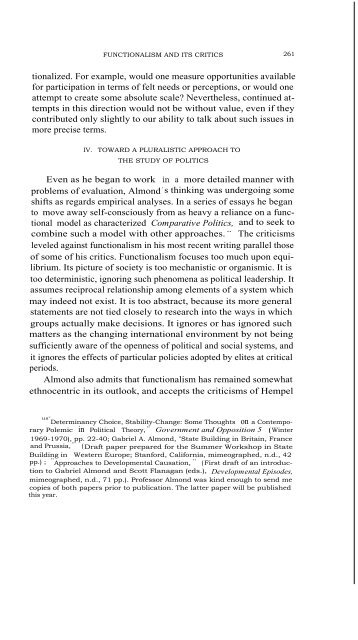FUNCTIONALISM AND ITS CRITICS - Intercollegiate Studies Institute
FUNCTIONALISM AND ITS CRITICS - Intercollegiate Studies Institute
FUNCTIONALISM AND ITS CRITICS - Intercollegiate Studies Institute
You also want an ePaper? Increase the reach of your titles
YUMPU automatically turns print PDFs into web optimized ePapers that Google loves.
<strong>FUNCTIONALISM</strong> <strong>AND</strong> <strong>ITS</strong> <strong>CRITICS</strong><br />
tionalized. For example, would one measure opportunities available<br />
for participation in terms of felt needs or perceptions, or would one<br />
attempt to create some absolute scale? Nevertheless, continued attempts<br />
in this direction would not be without value, even if they<br />
contributed only slightly to our ability to talk about such issues in<br />
more precise terms.<br />
IV. TOWARD A PLURALISTIC APPROACH TO<br />
THE STUDY OF POLITICS<br />
Even as he began to work in a more detailed manner with<br />
problems of evaluation, Almond ' s thinking was undergoing some<br />
shifts as regards empirical analyses. In a series of essays he began<br />
to move away self-consciously from as heavy a reliance on a functional<br />
model as characterized Comparative Politics, and to seek to<br />
combine such a model with other approaches. " The criticisms<br />
leveled against functionalism in his most recent writing parallel those<br />
of some of his critics. Functionalism focuses too much upon equilibrium.<br />
Its picture of society is too mechanistic or organismic. It is<br />
too deterministic, ignoring such phenomena as political leadership. It<br />
assumes reciprocal relationship among elements of a system which<br />
may indeed not exist. It is too abstract, because its more general<br />
statements are not tied closely to research into the ways in which<br />
groups actually make decisions. It ignores or has ignored such<br />
matters as the changing international environment by not being<br />
sufficiently aware of the openness of political and social systems, and<br />
it ignores the effects of particular policies adopted by elites at critical<br />
periods.<br />
Almond also admits that functionalism has remained somewhat<br />
ethnocentric in its outlook, and accepts the criticisms of Hempel<br />
us"<br />
Determinancy Choice, Stability-Change: Some Thoughts on a Contemporary<br />
Polemic in Political Theory, " Government and Opposition 5 ( Winter<br />
1969-1970), pp. 22-40; Gabriel A. Almond, "State Building in Britain, France<br />
and Prussia, "<br />
(Draft paper prepared for the Summer Workshop in State<br />
Building in Western Europe; Stanford, California, mimeographed, n.d., 42<br />
pp.) ; " Approaches to Developmental Causation, " ( First draft of an introduction<br />
to Gabriel Almond and Scott Flanagan (eds.), Developmental Episodes,<br />
mimeographed, n.d., 71 pp.). Professor Almond was kind enough to send me<br />
copies of both papers prior to publication. The latter paper will be published<br />
this year.<br />
261
















